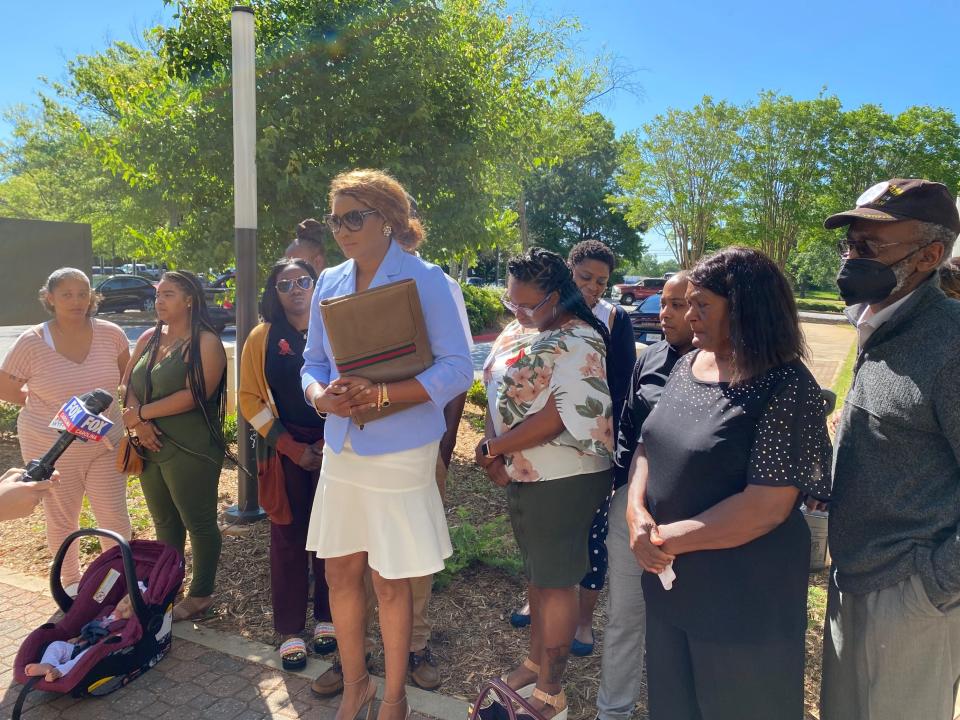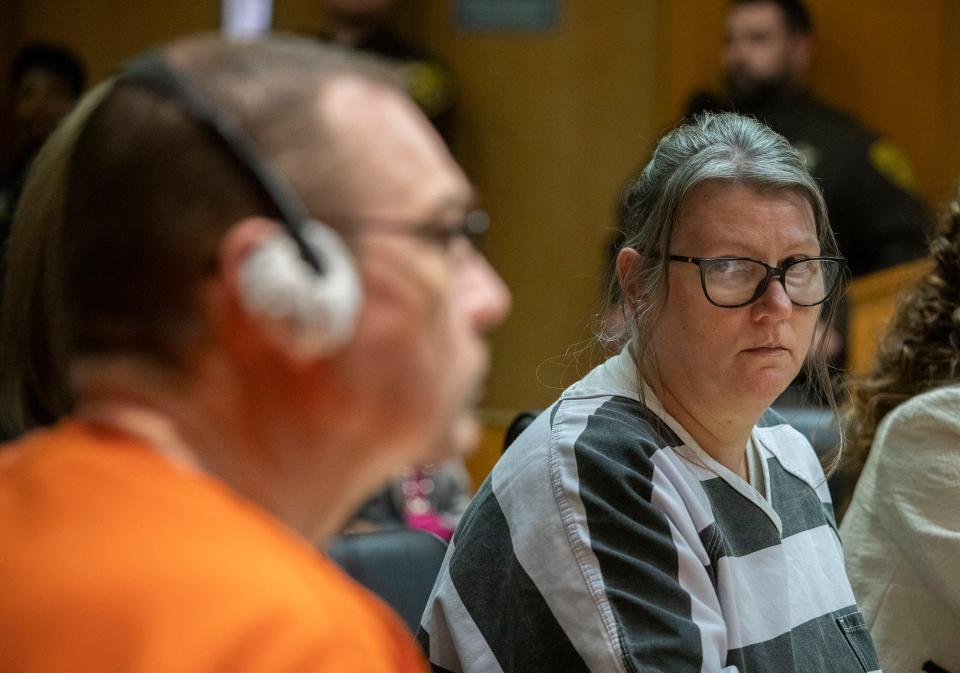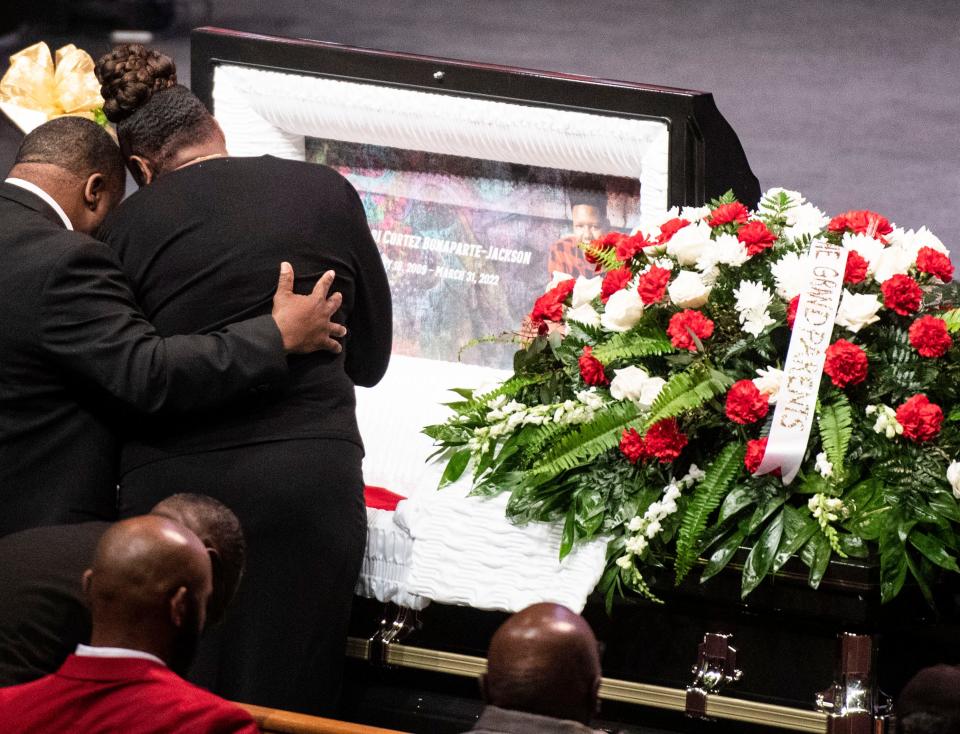Father, aunt of Tanglewood Middle School shooting suspect sued for negligence
The family of a Tanglewood Middle School student who was shot and killed at school over two years ago is suing the family of the juvenile suspect, claiming they irresponsibly allowed him access to a gun.
Jamari Cortez Bonaparte-Jackson was shot and killed in the hallway of Tanglewood Middle School in March 2022. Late last month, a family court judge in Greenville decided that the now 14-year-old accused of Bonaparte-Jackson murder will be tried in adult court.
The parents of Bonaparte-Jackson are now suing the father of Jordan Williams, who shares the same name, for illegally possessing and failing to secure the gun that was used to kill Bonaparte-Jackson. The family is also suing the elder Williams’ sister, Tekoa Williams, for negligence in providing the gun to her brother.
Several Upstate attorneys told the Greenville News that the civil and criminal components of the case are complicated but said the two processes seek different outcomes. While the criminal justice system deals with punishment, the civil process aims to make the victims whole, one attorney said.
Previously: Judge rules teen suspect in Tanglewood Middle School shooting will be tried as an adult
But the civil lawsuit, filed March 28, came less than two weeks before a criminal case in Michigan set a potential new precedent for parents of juveniles who commit serious crimes.
On April 9, the parents of a teenager who shot and killed four students and injured seven others at Oxford High School in 2021 were each sentenced to 10-15 years in prison for four counts of involuntary manslaughter. It is the first time the parents of a mass shooter have been held criminally responsible in U.S. history, the Detroit Free Press reported.

What is the father, aunt of Tanglewood murder suspect being sued for?
Both Tekoa and Jordan Williams Sr. are being sued under multiple claims of negligence, including negligent supervision.
According to the lawsuit and the two-day waiver hearing in family court last December, Tekoa provided the elder Jordan Williams the firearm that was found and ultimately used by his son to kill Bonaparte-Jackson.
The lawsuit alleges that the elder Williams was negligent in obtaining the firearm from his sister, unlawfully possessing a firearm and not securing the firearm in a safe where it would have been inaccessible to his son. It also claims he was negligent by allowing his son to possess and carry the gun with no firearms experience or training.
The complaint also implicates Tekoa Williams for allowing the gun into the house.
"Tekoa Williams knew or should have known that allowing an untrained and inexperienced individual unsupervised access to a firearm was extremely dangerous to the general public, especially those he would encounter during the day, and it was foreseeable that another person would be injured unless reasonable steps were taken to supervise and control him," the lawsuit said.
The lawsuit adds that Williams Sr. was previously convicted of criminal domestic violence and prohibited by law from owning or possessing a firearm.
Attorney Margie Pizarro told the News that the chain of negligent acts alleged in the complaint speaks for themselves.
"This was your (the aunt’s) property that you entrusted, or gave, to another person (the father) and that person, as it turns out, wasn't supposed to have that piece of property. He wasn't supposed to be in possession of a handgun," Pizarro said.

A new criminal precedent? Parents of a Michigan school shooter sentenced
This week, the parents of Oxford school shooter Ethan Crumbley, who killed four in Michigan, were sentenced to 10-15 years each for four counts of involuntary manslaughter. It is the first time the parents of a mass shooter have been criminally convicted for their child’s actions.
An Oakland County Circuit judge concluded that Michigan's recommended sentencing guidelines of 43-86 months did not take into account the harm of the shooting and the "lack of responsibility" assumed by the Crumbley parents, the Detroit Free Press reported.
Price called the Michigan case an extreme and "atrocious" example and said the parents "truly failed" their son, who was sentenced to life imprisonment without the possibility of parole. While Pizarro said she could not comment extensively on the criminal side, she admitted the facts of the Michigan case are "different."

Greenville attorney Stuart Sarratt, who formerly served in the 13th judicial circuit public defender’s office, said that criminal liability for parents in cases such as school shootings in South Carolina are unchartered waters.
"I could see a situation where if you leave an unattended gun loaded on the living room table, and a child gets access to it, then you could certainly be prosecuted for child neglect," Sarratt said. "But it's very different to then say, ‘Well, what if that child takes that gun and hurt somebody else? I've never seen that case.’"
Sarratt said the most common child neglect charge is unlawful conduct toward a child, a felony that carries up to 10 years. He added the two main instances in which this charge occurs are when a child tests positive at birth for illegal substances and when children live in "deplorable" conditions.
He said an "overzealous" prosecutor could attempt to pursue charges against parents in some cases where children are involved in crime, though the grand jury system is a potential check that could reject a prosecutor’s efforts if there were not enough evidence.
However, Sarratt mused that such aggressive prosecution could create a slippery slope.
"If you can hold parents responsible for what the child does with the gun, what if you've got a teenager who has been racking up speeding tickets and it's just a matter of time before they hit somebody, and then they do? Are we going to start holding parents responsible for the bad driving of their children?" Sarratt said.
Pizarro said the situation is "novel," and is not sure if it will affect prosecution in South Carolina. Pizarro and Young both said they trust the solicitor’s office to adequately handle the criminal prosecution of the case.

What does civil liability for parents in South Carolina look like?
Spartanburg attorney Steven Epps told the News that the civil and criminal systems look to achieve different goals. While the criminal side deals with governing laws and punishments when those statutes are broken, the civil side attempts to restore someone back to the "status quo" before the event in question.
"The judicial system is imperfect, and one obvious shortcoming is there is no good way to try to restore the status quo in this situation," Epps told the News in an email. "The civil – or criminal, for that matter – system does not have a magic wand or time machine. The only real way to try to ‘resolve’ this in a civil case is by a financial award, whether in an agreed upon settlement or a future jury trial."
Attorney Bill Young, who is representing Bonaparte-Jackson's parents, agreed that the two systems have "completely different goals." Young added that nothing is going to give the parents their son back, but the attorneys hope to arrive at a settlement that is fair. Pizarro said a financial amount has not been determined yet.
In South Carolina, Epps said violation of a criminal law can lead to a civil allegation that the violator was negligent, such as in the Tanglewood civil suit. Epps used the example of a felony DUI defendant who causes another person’s death or injury also being sued in a civil case. That suit could extend to the defendant’s family.
For negligence to be established, someone – in this case the suspect’s father and aunt – must owe Bonaparte-Jackson's parents a "duty," that duty must be breached and that breach must damage the claiming party.
Epps said the question that must be answered in the Tanglewood case and other similar cases is whether there was a duty owed by the suspect’s family to the victim’s parents. The lawsuit said Williams Sr.’s duty was to control his child and prevent him from harming others.
In South Carolina, state statute says parents are only liable for up to $5,000 in damages for their children’s actions. However, Greenville attorney James Price said this only applies to literal damages, such as to property.
The standard of proof needed for a civil case is much lower than a criminal one, where the burden is on the state to prove "beyond a reasonable doubt" that the suspect committed the crime.
"Having more than enough evidence is really what’s needed (in criminal cases)," Sarratt said. "It's not always, I would say, applied properly in criminal cases. But ideally, it's the state’s burden, and it's the highest burden that there is in all of our legal system. Just regular civil negligence, suing for damages and civil court, it's much, much lower, just 51% preponderance of the evidence, more likely than not."
Chalmers Rogland covers public safety for the Spartanburg Herald-Journal and USA Today Network. Reach him via email at crogland@gannett.com.
This article originally appeared on Herald-Journal: Father, aunt of Tanglewood shooting suspect sued for negligence

